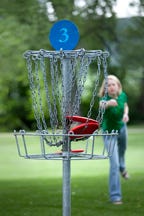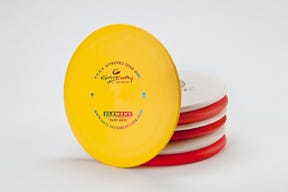Drive for show, putt for dough
Pushed from selling the product to manufacturing it, David McCormack now injection molds and markets a highly popular line of discs for the expanding ranks of disc-golf enthusiasts, utilizing compounds from RTP for a line of “putters,” whose unique feel is creating devoted users.
October 22, 2009
Pushed from selling the product to manufacturing it, David 
McCormack now injection molds and markets a highly popular line of discs for the expanding ranks of disc-golf enthusiasts, utilizing compounds from RTP for a line of “putters,” whose unique feel is creating devoted users.
How devoted? Browsing through user comments at Disc Golf Review, feedback on Gateway Disc Sports’ (St. Louis, MO) Sure Grip line includes, “[Gateway’s disc] has definitely taken a permanent spot in my bag,” “awesome,” “one of the greatest discs available,” and “one of the most versatile and reliable approach discs on the market.”
|
From 1984-1998, McCormack actually sold discs for a current competitor before changes at the company forced his hand and had him machine shopping. “Long story short, one of my competitors, who I sold discs for, was splitting up their company and allowed one of the entities to take about 12 accounts from me, and would not give them back,” McCormack says. “As an idle threat I said, ‘I’ll just make my own discs then.’”
The company McCormack founded has been doing just that for about 10 years now, molding the discs in-house on two 170-ton Toshibas. McCormack says Gateway has molded about 80,000 through the first nine months of 2009, with 100,000 to be produced by the end of the year, if its thermoplastic polyurethane (TPU) and TPU blends are counted. Cycle time is approximately 40-45 seconds, with logos applied via hot stamping, although the company is working on incorporating inmold decoration.
Not your typical Frisbee
Disc golf, like its club and ball inspiration, features different discs for different shots, typically based on distance, including drivers, midrange, and putt and approach discs. The discs used bear little resemblance to giveaway Frisbees, with Gateway utilizing a mix of filled and unfilled TPUs, polyproyplene (PP), and thermoplastic vulcanizate (TPV) for products with a smaller diameter, greater thickness, and different tactile feel.
When the company looked to upgrade its Sure Grip line of putt and approach discs (the “hole” in disc golf is a metal pole with a chain net), it turned to custom compounder RTP Co. (Winona, MN) seeking a material that could accept mineral additives to reach a density of 2.0. At that mass, McCormack felt Gateway would be able to maintain the discs’ flexibility and allow them to be used in a variety of playing conditions. The company worked with other suppliers, only achieving a density of 1.6, before it reached 2.0 with RTP, applying its 2800 B Series high-gravity TPV. “We have used many other material suppliers. RTP is the best,” McCormack states plainly.
|
McCormack says the method of mixing each batch to get the right flex and weight is a “cross between math, science, and art,” but the company prefers to dry blend its batches as opposed to using a masterbatch, since the dry blending allows the softest of the materials to migrate to the surface of the part, making for “soft, tacky, grippy discs” even if they are not that flexible.
“The real reason we feel our putters are more successful is the range of grips and feels,” McCormack says. “It’s like buying a good micro brew compared to the same old Bud Light,” noting that Gateway still spends hours dry blending formulas for 200-1200 disc batches, while many competitors simply mass produce. —Tony Deligio
About the Author(s)
You May Also Like




